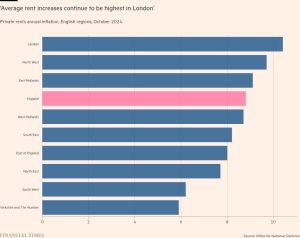Mexico grapples with its hidden Chinese trade problem
Unlock the Editor’s Digest for free
Roula Khalaf, Editor of the FT, selects her favourite stories in this weekly newsletter.
A Chinese tyremaker recently broke ground on a $400mn plant in central Mexico. But there will be no sign of such a Chinese project in Mexico’s inward investment data: the Sailun Tire company funding is being made through a Singaporean subsidiary.
This is not unusual or a secret — the structure is outlined in the company’s press release — but it will only fuel Washington’s wariness. US-based consulting firm Rhodium Group estimated in a report this month that the stock of Chinese investment in Mexico is about six times higher than shown in official figures.
With imports from China also surging, US lawmakers allege the country’s southern neighbour — and top trading partner — is increasingly being used by Beijing as a backdoor to avoid tariffs.
It presents Mexico with an urgent challenge: coming up with a more comprehensive and reassuring map of Chinese investment. Mexico’s primary interest is in protecting its dominant trading relationship with America — and that is put at risk if its China relations look suspect.
“If we feel like the Mexicans are hiding something from us . . . it will result in a loss of trust that cuts against the North American project,” said Ryan Berg of Washington think-tank the Center for Strategic and International Studies.

Former president Donald Trump has already warned he would “have a lot of fun” renegotiating the US-Mexico-Canada trade deal (USMCA) if re-elected, aiming to put limits on products made by Chinese companies entering the US. Democrats are also signalling a tougher line.
“Clearly there is very strong pressure from the US, and clearly that pressure is going to be bipartisan,” said Roberto Durán, an associate professor at Tecnológico de Monterrey university.
Government data suggests that in 2023 less than 2 per cent of Mexico’s foreign direct investment came from China and Hong Kong, about $450mn. For the same year Rhodium found $1.7bn of completed FDI transactions, almost four times higher.
The report’s co-author Armand Meyer said the firm saw similar gaps in other countries, and that Mexico’s reflected well-known data issues such as the use of offshore entities rather than suspect methodology.
There are other issues that could contribute to an undercount more broadly. Jorge Gonzalez, co-chief executive of The Nearshore Company, which helps foreign manufacturers set up in Mexico, said many companies imported used equipment that was mostly or fully depreciated.
Whatever the cause, there is a lot at stake for Mexico, which sends more than three-quarters of its exports to its northern neighbour, with USMCA fundamental for many of its foreign investors.
Two of new President Claudia Sheinbaum’s priorities are also in industries where Chinese companies are highly competitive: clean energy and trains. Whether Trump or vice-president Kamala Harris wins the US election, pressure is likely to grow.
Deputy economy minister Luis Rosendo said Mexico wanted to work “hand in hand” with the US and Canada, and was reviewing its tracing of Chinese investments.
The government is also analysing a package of measures including national security investment screening, preventing forced labour in supply chains and substituting imports for local products.
“Mexico is open to the world, but Mexico also has strategic trade partners . . . Canada and the US are key for our economy,” Rosendo told the Financial Times. “There is a protectionist consensus not seen in decades.”
The broader US-Mexico relationship has been rocky in the past few years with conflicts bubbling over energy, migration and the deadly drug fentanyl being made from Chinese precursors.
US concerns, and Chinese investment interest, are particularly acute in the auto sector, an economic driver in Mexico and several US swing states.
Trump has repeatedly claimed that gigantic Chinese electric vehicle factories are being built south of the border. Though groups such as BYD and Chery have scouted sites, no major plant has been announced yet.
Some in Mexico’s private sector point out that Chinese companies are also subject to the same rules of origin requirements as any other foreign investor.
Tire Direct International, a Mexican group that is partnering with Sailun, said that its tyres would be fully made in Mexico and that about 40 per cent of the production would be exported outside the US and Mexico.
“Our project isn’t a concern for the US because we aren’t using Mexico as a springboard,” the company said.
Even if it is several times larger than official figures, Chinese investment is still much smaller than the US, which accounts for more than a third of Mexican FDI.
But Mexico should not risk underestimating US feeling on the issue, and instead should carry out a cool-headed analysis of which investments were in its best interest, Durán said.
On Chinese investment, he added: “Will it generate development, will it generate growth, or in the end will it just cause problems with the Americans?”
#Mexico #grapples #hidden #Chinese #trade #problem





